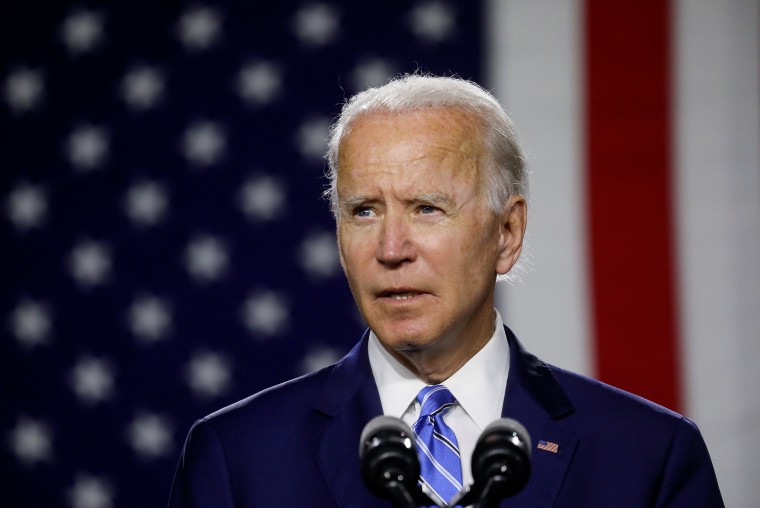Presumptive Democratic nominee Joe Biden's pick for vice president has been viewed as more important than usual because, if he is elected, he would be both the oldest president and, potentially, the first intentional one-termer since Rutherford B. Hayes took office in 1877. Whoever Biden chooses, then, will immediately become a presumptive future presidential nominee and Biden's successor were he to become unable to complete his term in office.
And, almost as important, his choice of running mate will give voters the most critical evidence of who the president believes should be not just a key adviser, but also the only one he can't remove.
Still, while the specifics of Biden's candidacy make his selection of a running mate perhaps more consequential beyond the electoral politics, it's also the case that the vice presidential pick has become the most far-reaching decision of every presidential campaign.
All of this would be a shock to vice presidents of ages past — even those from less than a century ago. The vice presidency was long considered a political graveyard, derided as "the most insignificant office that ever the invention of man contrived or his imagination conceived" by its first occupant, John Adams, and "not worth a bucket of warm piss" by Franklin D. Roosevelt's first vice president, John Nance Garner. (Even Biden jokingly referred to the job as "a bitch" in 2014.)
And so it was for 124 years, from the time Vice President Martin Van Buren won the Democratic Party's nomination (and then the presidency) in 1836 until Vice President Richard Nixon was awarded the Republican presidential nomination in 1960. No vice president elected in between later captured his party's nomination for president. Seven vice presidents during that time managed to become president, but only because the presidents they served died in office. And four of those who did couldn't even get their party's nomination after having served as president.
However, starting with Nixon — excluding Mike Pence so far, of course — eight of the last 13 vice presidents went on to win their party's nomination for the presidency. Only the disgraced Spiro Agnew, the unelected Nelson Rockefeller, the long-ridiculed Dan Quayle and the health-challenged Dick Cheney — all Republicans — didn't manage this feat. All five Democrats in that group of 12 (Johnson, Hubert Humphrey, Walter Mondale, Al Gore and Biden) ended up capturing the nomination.
This change coincided, perhaps unsurprisingly, with a new method of choosing nominees. Before the 1960s, presidential candidates were selected during the parties' conventions, and the vice presidential slot was a last-minute bargaining chip and consolation prize for some faction of the party or candidate. But once the primaries became prominent, presidential nominees gained the full ability to select their running mates, leading to more focus on prominent political figures who could boost the ticket. The higher name recognition of vice presidential candidates from the outset gave them more ability to build political organizations for later presidential runs — and meant the public viewed the vice president as more of an heir apparent.
Beyond that, almost any president will retain high popularity among the party base, which a vice president is able to use while wrapping himself in the role of successor. We saw this with Biden's run: While he looked weak in the early primary campaign, he alone could claim to be President Barack Obama's successor.
The impact on future elections is clearly one part of the equation; the other is that vice presidents have, in recent years, been elevated to key roles in every president's governing team, which wasn't the case earlier in American history. With extremely rare exceptions — notably Van Buren and William McKinley's first vice president, Garrett Hobart — the vice president was ignored by the president. But ever since Harry Truman's second-term vice president, Alben Barkley, they have increasingly become central players in the White House.
That may be because the president wants to show that he made a good choice, but it also might be a natural result of the fact that the vice president can't be removed by the president. As President Donald Trump has shown, a president can oust advisers, Cabinet members, generals and even the FBI director, and family members can be divorced and disowned.
But vice presidents are independent entities who stay in place. It is only after the second inauguration of a president who is re-elected with a new running mate that they can be removed (and replaced), and that rarely happens anymore because it reflects poorly on the president.
The growth of the role of the vice president is a potentially positive development. Since at least President Andrew Jackson's so-called "Kitchen Cabinet," every president has always relied on the advice on unelected and frequently relatively anonymous people. (Trump, with his well-reported penchant for calling old colleagues for advice instead of listening to government experts, has taken this to a new level.) The vice president, at least, has been vetted and analyzed in the media and has received the approval of the voters, and having him or her serve as a key adviser at least gives voters an understanding of who will influence the president.
While many stories about Biden's choice of a running mate will likely focus on how the person will help in November, history shows that any given candidate may not matter for that purpose. But the longer-term impact of a vice president — both as an adviser and a successor — is enormous, as Biden himself can attest.
Related:




